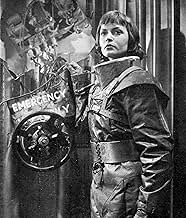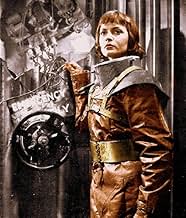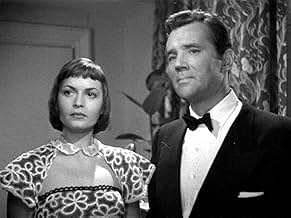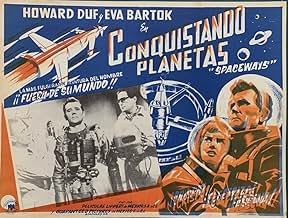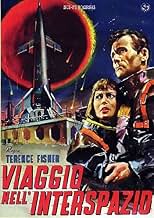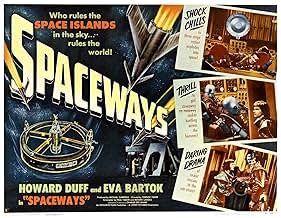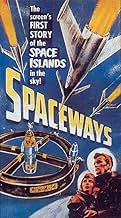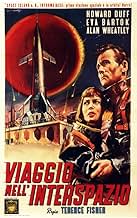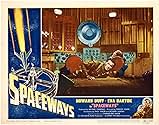Agrega una trama en tu idiomaBritish scientists test rocket; matrimonial strife looms. Rocket partially fails; couple goes missing. Did they elope or are they dead, orbiting in rocket debris?British scientists test rocket; matrimonial strife looms. Rocket partially fails; couple goes missing. Did they elope or are they dead, orbiting in rocket debris?British scientists test rocket; matrimonial strife looms. Rocket partially fails; couple goes missing. Did they elope or are they dead, orbiting in rocket debris?
- Dirección
- Guionistas
- Elenco
Leo Phillips
- Sergeant Peterson
- (sin créditos)
Marianne Stone
- Mrs. Rogers
- (sin créditos)
Jean Webster-Brough
- Mrs. Daniels
- (sin créditos)
Opiniones destacadas
American scientist Howard Duff goes to work on a British space program. The first launch is a failure.... and two of the scientists disappear. Suspicion flls on Duff. Did he murder them?
It's a rather desultory science fiction mystery based on a successful radio script by Charles Eric Maine. Born David McIlwaine, he was a science fiction fan who published his own 'zine before the Second World War. After the war, he became a writer, publishing sf as Maine, mysteries as Richard Rayne and Robert Wade. He died in 1981 at the age of 60.
This movie is not helped by the ham-handed technical terms tossed about in tones that insisted they were very meaningful, nor the flat pace of of the editing.
It's a rather desultory science fiction mystery based on a successful radio script by Charles Eric Maine. Born David McIlwaine, he was a science fiction fan who published his own 'zine before the Second World War. After the war, he became a writer, publishing sf as Maine, mysteries as Richard Rayne and Robert Wade. He died in 1981 at the age of 60.
This movie is not helped by the ham-handed technical terms tossed about in tones that insisted they were very meaningful, nor the flat pace of of the editing.
The title and the poster tend to set the viewer up for a large disappointment with this one, a less-than-gripping film from director Terence Fisher, laudable mostly for the fact that it was made so early in the 1950s. The story is based on a radio play by Charles Eric Maine, with a plot that smacks just a little of an Alfred Hitchcock movie.
Howard Duff plays an American scientist involved with the British space program (they actually had one of those, once). His wife is having an affair with another scientist (Andrew Osborn) who is also a spy. When both wife and lover disappear, an investigator (Alan Wheatley) suspects Duff of murdering them and disposing of the bodies by placing them in a new satellite which is sent into orbit!
There's only one way Duff can clear himself: blast off in a rocket, retrieve the satellite, and bring it back for inspection. He takes Eva Bartok (heroine of 'The Crimson Pirate') with him.
I won't divulge the ending, but it is a twist. The film's slow pace lessens the tension, and the special effects consist largely of stock footage and a few scenes cribbed from 'Rocketship X-M'. Definitely a case of the poster being far better than the movie -- but what a poster!
Howard Duff plays an American scientist involved with the British space program (they actually had one of those, once). His wife is having an affair with another scientist (Andrew Osborn) who is also a spy. When both wife and lover disappear, an investigator (Alan Wheatley) suspects Duff of murdering them and disposing of the bodies by placing them in a new satellite which is sent into orbit!
There's only one way Duff can clear himself: blast off in a rocket, retrieve the satellite, and bring it back for inspection. He takes Eva Bartok (heroine of 'The Crimson Pirate') with him.
I won't divulge the ending, but it is a twist. The film's slow pace lessens the tension, and the special effects consist largely of stock footage and a few scenes cribbed from 'Rocketship X-M'. Definitely a case of the poster being far better than the movie -- but what a poster!
This movie was a lot better than I expected.While it was another short movie with extended periods of nothing and the plot wasn't the greatest, the acting is above average and the movie isn't boring.They do a good job of covering the bases and making sure there are no plot holes but the plot is so average that it doesn't help that much.A scientist is accused of killing his wife and another man and putting them in a rocket and sending it into space.Instead of telling them to look for the those people, he just jumps in a rocket to go get the other rocket and prove they aren't in it.The best thing about the movie is that their space program is realistic, it doesn't work.Four stars, give it a shot.
1952's "Spaceways" was an early Hammer Films example of low key science fiction (Britain's first since H.G. Wells' 1936 "Things to Come"), as well as the practice of importing a Hollywood star to headline, the recently blacklisted Howard Duff supplied by coproducer Robert L. Lippert, who also provided stock spaceship footage from his own "Rocketship X-M." Dr. Stephen Mitchell (Duff) is among the leaders of a government approved research project to send an orbiting satellite into the earth's atmosphere, as a way to monitor activities all over the world. A possible security breach occurs with the simultaneous disappearance of Mitchell's wife, along with a fellow scientist with whom she was having an affair; military investigator Smith (Alan Wheatley) reaches the conclusion that Dr. Mitchell killed them both and ensured the recent failure of their latest rocket (stuck in orbit indefinitely) by draining enough fuel to allow the presence of two corpses. This 'perfect crime' scenario understandably angers Mitchell, who volunteers to prove his innocence by going up in space himself to recover the first rocket, though only mice and monkeys have previously been used as guinea pigs. Not as bad as it certainly could have been, with Alan Wheatley showing the dogged determination of Peter Cushing in his probing and eventual discovery of the truth. For those impatiently wondering if we ever blast off, well, it's saved for the final reel of this 76 minute picture. Leading lady Eva Bartok provides eye candy but not much else in the thinly written part of the female scientist who quietly loves Duff's oblivious Mitchell, only revealing her feelings after his wife vanishes. The Hungarian-born beauty was making just her sixth feature, but had earned recent acclaim in Burt Lancaster's "The Crimson Pirate" (also starring Christopher Lee), and after a decade of tabloid headlines for off screen affairs would retire from the screen following her best known genre effort, Mario Bava's "Blood and Black Lace" in 1964. "Spaceways" shows obvious signs of its radio origins from the pen of Charles Eric Maine, who later adapted his own screenplays for "The Atomic Man" and "The Electronic Monster," the final result scripted by Hollywood's Richard H. Landau and Hungarian-born British writer Paul Tabori. As a Hammer production from Michael Carreras and assistant director Jimmy Sangster, it's a pleasure to see Terence Fisher at the helm, as he also was for "Stolen Face" and "Four Sided Triangle" eventually to make his horror debut with 1957's "The Curse of Frankenstein."
Many reviewers have unfairly criticised this film for lack of accuracy in the space portion of this yarn. Well, in 1953 we knew very little about space, so that must be forgiven.
As so little was known about space in those days, the writers had to fill out a good proportion of the film with a fairly standard love/mystery story, including a nice little plot twist.
I enjoyed this film as it had good performances from all the actors. It's definitely worth a view.
As so little was known about space in those days, the writers had to fill out a good proportion of the film with a fairly standard love/mystery story, including a nice little plot twist.
I enjoyed this film as it had good performances from all the actors. It's definitely worth a view.
¿Sabías que…?
- TriviaPrincipal photography on Spaceways took place at Bray Studios, Windsor, England from mid-November 1952 to early January 1953.[1] Some of the scenes of the spaceship taking off were special effects shots taken from the Lippert film, Rocketship X-M (1950).
- ErroresAt the beginning of the movie, when Howard Duff exits the van inside the base, the whole filming crew is reflected against the side of the van.
- ConexionesEdited from De la tierra a la luna (1950)
Selecciones populares
Inicia sesión para calificar y agrega a la lista de videos para obtener recomendaciones personalizadas
- How long is Spaceways?Con tecnología de Alexa
Detalles
- Fecha de lanzamiento
- Países de origen
- Idioma
- También se conoce como
- Космические пути
- Locaciones de filmación
- Productora
- Ver más créditos de la compañía en IMDbPro
- Tiempo de ejecución
- 1h 16min(76 min)
- Color
- Mezcla de sonido
- Relación de aspecto
- 1.37 : 1
Contribuir a esta página
Sugiere una edición o agrega el contenido que falta

